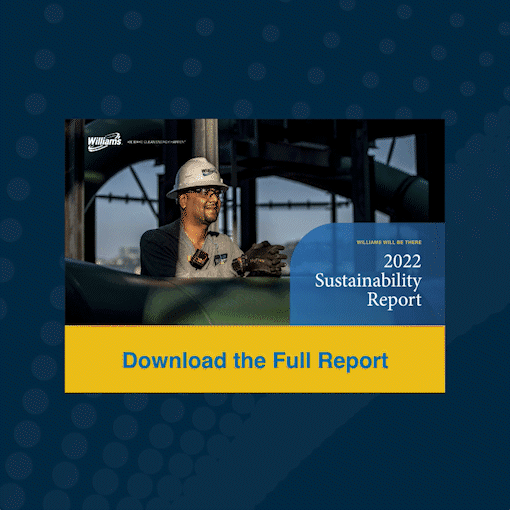Why This Matters to Williams
Williams safely and reliably handles approximately one third of the country’s natural gas, and we are proud that our infrastructure is part of the solution to ensure the availability of natural gas to the 77 million homes and businesses utilizing natural gas in the continental U.S. The U.S. Energy Information Administration (EIA) reports that 61% of U.S. households use natural gas for at least one energy end use.[1] Our ability to provide affordable and reliable energy to our customers results in economic growth, higher quality of life and improved standards of living, which can help alleviate poverty. Access to affordable and reliable energy is crucial as the U.S. economy transitions to low carbon. As the world deploys more renewable energy sources, especially in power generation, natural gas is the optimal backup source to maintain grid reliability and energy affordability. The recent Winter Storm Elliott is one of numerous instances in which natural gas has been called upon as a back up energy source when renewable electric power generation was inadequate or not readily dispatchable. Access to reliable power is increasingly critical as climate change-related weather events grow more frequent and unpredictable. Additionally, Williams can enhance energy security globally by deploying affordable, U.S.-sourced LNG to alleviate geopolitical gas supply shortages and providing access to reliable energy across the world. Williams’ operational discipline and reliable service allows it to be a preferred midstream partner for global energy security and affordability.
[1] U.S. Energy Information Administration, 2020 Residential Energy Consumption Survey.
Meeting the Demand for Reliable Energy
Natural gas is a vital resource in meeting the country’s goals of energy security, energy affordability and emissions reductions. Continued investment in natural gas infrastructure will be needed to reliably and affordability meet the increasing energy demands brought on by electrification. As one of the U.S.’s largest interstate pipeline transmission providers, Williams provides the infrastructure to ensure equitable distribution and access to affordable and reliable energy. We are dedicated to maximizing the value of our existing infrastructure to bring cleaner, cost-effective fuels across our operational footprint. We do this by connecting the best supplies of natural gas with our country’s largest demand centers while also working to support the reliability of renewable energy. By boosting operational efficiencies and expanding our safe transmission network, we can achieve our business objectives while reducing costs, expanding access in underserved areas and easing supply constraints affecting our customers.
Williams is consistently developing opportunities to ensure access to affordable and reliable energy. Our slate of current natural gas transmission projects seeks to grow our infrastructure to expand energy access to meet increasing demand and provide our customers with reliable supply. We examine the best means of designing and executing proposed projects that minimize environmental and community impacts while delivering enhanced customer service. Specifically, we use socioeconomic demographic assessments to evaluate the effects on overburdened communities and emissions reduction efforts to mitigate environmental impacts. These efforts aid our ability to meet our social and environmental commitments while allowing Williams to continue providing access to affordable energy to our customers and their end users.
Williams’ executives play a vital role in articulating the market need to expand natural gas as an immediate cleaner energy solution while pursuing emerging energy sources. Our executive-level oversight for energy access includes advocacy for expanding our services, especially in our existing operating areas. Throughout 2022, Williams’ leadership participated in and, in some cases, led engagement efforts to promote the benefit of natural gas as a cleaner energy source that can positively impact local economies and improve living standards.
Williams received stakeholder interest on various aspects of energy access, affordability and reliability in 2022. For example, we received a greater number of questions regarding the purpose and need for expanded natural gas facilities. In response, we continued to inform and engage the public regarding the prevailing market conditions, showing the need for additional gas supply to ensure reliable access and affordable energy. We also experienced additional input related to the need to inform and engage communities near existing natural gas facilities, particularly communities who have historically faced environmental justice challenges. As part of our community stakeholder engagement efforts, we enhanced our approach to environmental justice outreach and implemented specific actions that aided our response time and follow-up actions. For more information regarding our engagement efforts, please refer to the Stakeholder Relations, Economic Impacts and Environmental Justice sections.
In 2022, Williams continued to press forward with multiple expansion projects seeking to expand pipeline infrastructure to bring additional volumes of natural gas to areas of growing domestic demand. For example, our Regional Energy Access Expansion project reached agreements with all landowners, obtained all required permits, and secured a final environmental impact statement from FERC. The project has successfully broken ground after receiving authorization to begin construction. The Regional Energy Access Expansion will add up to 829,000 dekatherms per day of supply in Pennsylvania, New Jersey and Maryland, helping to ease supply constraints in this high-demand region, which keeps end-consumer gas accessible and consistently priced. We are also executing our Southeast Energy Connector, Commonwealth Energy Connector and Louisiana Energy Gateway projects.
Our newly proposed projects also continued to make progress in the past year. In 2022, Williams filed an application with FERC for the Southside Reliability Enhancement, a proposed project to expand and modernize the existing Transco pipeline to add natural gas capacity to North Carolina.
We also proposed increasing energy capacity in Texas and Louisiana by growing the current transmission pipeline capacity through Texas to Louisiana Energy Pathway. These projects will increase natural gas delivery to meet these regions’ growing demand for affordable energy.
We also made strides to expand our LNG footprint, which enables us to enhance energy accessibility, affordability and reliability globally. Williams is evaluating partnership opportunities to connect low-emission natural gas supply basins to LNG export facilities along the Gulf Coast. If successful, we anticipate these partnerships will expand transmission services to domestic producer customers and amplify our ability to ease supply constraints overseas.
Reliability refers to our ability to continue to transfer our product throughout disruptions to operational conditions, including necessary maintenance. Williams completes monthly evaluations across our gathering and transmissions systems to identify operational conditions or maintenance activities which may have resulted in an impact to customer receipts or deliveries. These evaluations are enumerated into the Customer Impacted Volume (CIV) percentage, which is shown in the Williams’ Reliability chart on this page. In 2022, we achieved a CIV rate of 99.65%, demonstrating the continued excellence of our operations and maintenance teams to minimize customer impacts while meeting demand.


